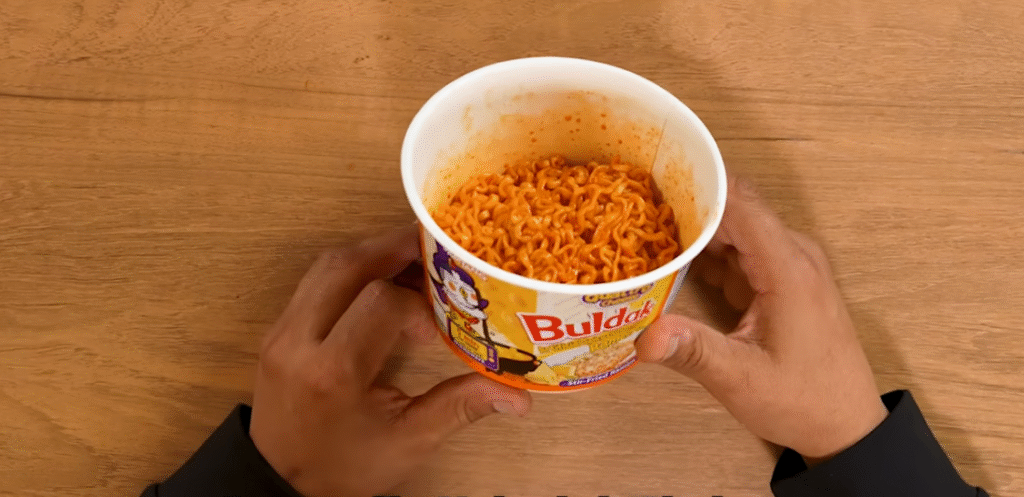Have Buldak been sued? Javeria Wasim, a Canadian TikTok influencer who goes by the handle “Jawbreaker Girl,” has sparked the debate on social media and made headlines around the world. She filed a lawsuit against Samyang Foods for $15 million Canadian dollars in August 2025 after claiming that the company’s fiery Buldak noodles caused her to develop a stomach ulcer. Most shockingly, she claimed to have already won. With the help of short videos and memes, the accusation spread remarkably quickly, but it left customers wondering what was true.
In a remarkably unambiguous denial, Samyang Foods referred to the allegation as “groundless.” They stressed that no payout had been made, no prohibitions on sales were in place, and no lawsuit had been filed in North America. For a company that has gained international recognition since its 2012 debut, the statement was incredibly successful in assuring devoted customers who were worried that the spicy noodles would disappear from stores.
Nonetheless, Wasim’s videos were unquestionably captivating. “I love Buldak, but I love $15 million more,” she joked in one, slurping the noodles she claimed were hurting her. She claimed in another, which was captured on camera from a hospital bed, that the spice had “burned a hole” in her stomach. The story sounded a lot like well-known legal cases like the McDonald’s hot coffee case, in which a customer claimed that a product that millions of people loved had caused them harm. However, in contrast to that instance, her story did not seem to be supported by any court filings, judgments, or documents.
Buldak Ramen – Essential Information
| Brand Name | Buldak Ramen (Hot Chicken Flavor Noodles) |
|---|---|
| Manufacturer | Samyang Foods, South Korea |
| Launch Year | 2012 |
| Global Sales | Over 6.6 billion packets sold by 2024 |
| Notable Product | Buldak-bokkeum-myeon (“fire chicken stir-fried noodles”) |
| Viral Fame | Popularized by the “Fire Noodle Challenge” on YouTube in 2014 |
| Lawsuit Claims | TikTok influencer Javeria Wasim (“Jawbreaker Girl”) claimed $15M suit in 2025 |
| Company Response | Samyang Foods stated no lawsuit was ever filed in North America |
| Controversies | Denmark recall in 2024 over extreme spiciness; copycat lawsuits and false claims |
| Legal Actions | Samyang filed lawsuits against counterfeit producers in China and Japan |
| Reference | The Korea Herald – Samyang Foods Statement |

The fact that Wasim kept including Buldak in her mukbang content was what made the drama so unique. She shared her favorite flavor combinations, recipes, and even a call to action for her followers to “buy them one more time before they’re off the shelves in Canada and the U.S.” The inconsistencies severely damaged her credibility in the eyes of critics, who frequently questioned, “Why eat it if you’re suing them?”
Samyang chose to take a proactive stance in response to spreading false information. Prior to the 2024 Denmark recall, when authorities decided that the Buldak 3x Spicy variety was too hot for consumers, the company had maintained its composure in the face of controversy. This time, the company’s communications strategy was noticeably better as it publicly addressed the influencer’s claims. Given that silence frequently permits rumors to spread unchecked, this was especially helpful in the context of digital culture.
Additionally, the case illustrates a larger cultural change. Nowadays, influencers have a remarkable amount of power to change public perception, and their posts have the ability to drastically alter brand narratives in a matter of days. Similar to how celebrity cancellations or endorsements have affected fashion brands, viral videos are increasingly threatening food companies. In addition to spreading trends, the Buldak controversy shows how highly effective these platforms are at igniting legal rumors that have an international impact.
In the meantime, Buldak’s worldwide success keeps growing. The fire chicken brand is incredibly resilient in the rapidly evolving food industry thanks to Samyang’s diversification into sauces, chips, dumplings, and frozen foods. Cases involving intellectual property against Chinese counterfeiters and packaging disputes in Japan demonstrate that the company is accustomed to facing legal challenges. However, those cases were based on proof, court decisions, and compensation, which contrasted sharply with the influencer’s unsubstantiated allegations.
The noodles continue to have ardent devotees. Many people find the spiciness to be part of the appeal. Some likened the situation to pop stars like Taylor Swift who are the target of online rumors: despite the commotion, their core fan base still supports them. Others compared food products to Serena Williams’ open stories about diet and health, pointing out that they frequently get caught up in larger cultural discussions about excess, responsibility, and wellness.
Important lessons were learned, but the controversy had already started to subside by late August. It showed that false information can spread remarkably quickly, that businesses need to react much more quickly, and that consumers need to strike a balance between skepticism and curiosity. Viral challenges, rumors, and lawsuits are all interwoven in the world of contemporary food culture.
Whether Buldak was sued or not is a very obvious answer: no. However, the rumor itself demonstrated how lively conjecture can get when paired with virality on social media. According to Samyang, the saga emphasized the necessity of especially creative communication, reminding them that even a false statement can have significant economic repercussions. Customers found it to be a warning about influence, trust, and the thin line separating fact from fiction.

